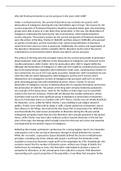Why did Protestant Dissenters survive and grow in the years 1660-1688?
Under a confessional state, the survival of dissenters was certainly not assured, with
declarations of indulgence showing the only intermittent signs of hope. The reasons for the
survival of growth of Protestant Dissenters should be evaluated based upon why dissenting
groups were able to grow at a rate faster than persecution. In this way, the declarations of
indulgence contributed the lowering the rate of persecution, which helped dissenters
survive and grow. The primary reasons for the survival and growth of Protestant dissenters
were the actions of the King, Charles II (1660-85) and then James II (1685-88), who pursued
an agenda of toleration, and the Clarendon code, whose broad definition of dissenters
meant that there were too many to prosecute. Additionally, the actions and organisation of
the dissenters themselves and the sympathy felt for dissenters by the end of the period
contributed to an environment where dissent was able to survive and grow.
The actions of the King were the strongest reason for the survival and growth of protestant
dissent between 1660 and 1688 due to the declarations of indulgence and resistance to the
Cavalier parliament, while Charles’ drive for persecution after 1683 is largely ineffective.
Although the Declarations of Indulgence in 1662 and 1673 might be considered unsuccessful
due to the parliamentary legislation which followed in both cases, clamping down further on
non-conformists, the act of 1672 was quite successful. Despite the 1664 Conventicle Act and
1665 Five Mile Act which followed the 1662 Indulgence and the 1673 Test Act which
followed the 1672 Indulgence, licences of Indulgence did not expire until 1675, by which
point dissenting groups had well-established practices. Hence, Charles II’s second
declaration of indulgence was key to allowing dissenters to organise themselves and survive
the persecution of 1683-86. The actions of the King were certainly limited by parliament,
one example of this being James’ need for the Godden vs Hales legal case to essentially
overturn the Test Act. However, Charles did not dissolve the Cavalier parliament, whose
Clarendon code was the most significant group of legislation in prosecution of dissenters,
due to its favourable stance on royalism until 1679. Hence, Charles was not wholly beneficial
for dissenters, as he, unlike his father Charles I, was unwilling to put religion ahead of
politics. Finally, from 1683 until his death in 1685, Charles lashed out at dissenters, due to
their alliance to the Whigs, who had led the Rye House Plot to assassinate him. While this
was theoretically the most severe persecution of dissenters during the 28-year period,
widespread sympathy meant that very few dissenters were actually punished in this period,
Hence, while Charles may have taken malicious actions towards dissenters in the last few
years of his reign, the damage which actually came from this was very minor and would be
overshadowed by the positive impact of Indulgence.
Reflecting the Cavalier parliament’s preferences for a strong Anglian church, the Clarendon
code played a role in the survival of dissenters through its broad definition for consent.
While the ‘via media’, espoused by Queen Elizabeth defined the church on latitudinarian
principles, excluding only those radicals who posed a real threat, the Clarendon Code
excluded so many that dissenters made up 8% of the population by 1700. Simplistically, this
exclusion meant that the number of dissenters grew, without any change of beliefs. But
furthermore, by excluding so many, the Clarendon code helped to produce a sense of
sympathy for dissenters, as the concept grew from radicals to outcasts. With dissenters
representing such a great proportion of the population, it was likely that any given family




